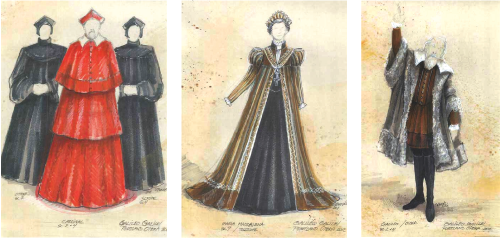Galileo Galilei, that famed 17th century Italian astronomer whose work pioneered the scientific method, earned the wrath of the Catholic Inquisition when he observed that the Earth revolved around the sun. It was a concept inimical to the Catholic dogma of the time, which taught that the Earth was the center of the universe. Galileo’s theories led to his trial and house arrest by the Catholic Inquisition, despite that he later recanted his findings.
The heretical science of Galileo

Galileo Galilei, that famed 17th century Italian astronomer whose work pioneered the scientific method, earned the wrath of the Catholic Inquisition when he observed that the Earth revolved around the sun. It was a concept inimical to the Catholic dogma of the time, which taught that the Earth was the center of the universe. Galileo’s theories led to his trial and house arrest by the Catholic Inquisition, despite that he later recanted his findings.
Galilei’s compelling life story is the subject of composer Philip Glass’s opera Galileo Galilei, which opens at the Newmark Theatre in the Keller Auditorium Friday, March 30, and will be performed by the Portland Opera. The opera will deliver encore performances throughout the following week.
A shorter, more intimate work than most operas, Galileo tells the story of the esteemed scientist as he contemplates his life’s work and the decisions he’s made. Anne Manson, conductor for the show, described Glass’s Galileo as “a chronological story that goes backwards.”
The opera opens with an aging and blind Galileo, played by tenor singer Richard Troxell, before flashing back through the events of his life.
“The story moves back in time, step by step,” Manson said. “It goes through his recantation and his trial, and it also features his daughter, Maria Celeste [played by Lindsay Ohse]. They were very close, even though she was in a convent for most of her teenage years and adult life.”
Troxell, who has spent months researching both the historical figure and the operatic character of Galileo, sees the opera as a deeply personal story that chronicles “the conflict of his love between his church and his science.”
“It’s a story of love. It’s Galileo’s love of his ideas, his inventions and everything that he did. And his commitment, not only to science, but also to his church. He was devout. He loved his faith and everything about it,” Troxell explained. “The sad part is that he gave up his science for his faith, though he kept his science secretly.”
Troxell is just one of many singers playing the role of Galileo. His tenor performance will depict the aged scientist before baritone singer André Chiang takes over, assuming the mantle of the younger Galileo. Even Galileo as a child makes a brief appearance, looking to the constellations as he listens to the compositions of his musician father, Vincenzo.
Manson urges opera newcomers to try out works like Galileo first, attributing its accessibility to its unique format. As one of Glass’s smaller-scale pieces, it adopts a more intimate tone and focuses more on the theatrical side than conventional works. It is also performed in English, with particular care taken to make song lines comprehensible.
“If you don’t know opera, if you haven’t had experiences with opera, this is the kind of piece you should see first because it has a wonderful theatrical quality to it,” she said. “The music is mesmerizing and just colors and enhances everything going on onstage.”
Glass has written other operas about history’s biggest names, such as Einstein on the Beach and Satyagrahah, based on the life of Mahatma Ghandi. In addition, he has composed several film scores, including Martin Scorsese’s Kundun and Stephen Daldry’s The Hours. Glass’s contemporaries have referred to him as a minimalist, due to the repetition of motifs in his work.
“Philip Glass has a very distinctive style. It is a very tonal style. It’s not dissonant and angular, like some contemporary music. It’s extremely rhythmical,” Manson said. “This particular piece is very lyrical and beautiful. It has some very beautiful vocal lines, and it’s very interesting, pairing his particular style with this subject, which relates to the stars, the earth and the sun. It feels like there’s a lot of circular motion in the piece.”
Both Manson and Troxell have traveled the world, performing at opera houses throughout the U.S. and beyond. Both have performed at the Portland Opera several times, and each is excited to return to the city.
“I’ve spent my life doing opera, and I find it incredibly compelling,” Manson said. “To me, what’s so compelling about opera is the combination of the musical, theatrical, literary and visual elements all coming together. To me, that’s an incredibly powerful art form.”
“Unlike a play, where it’s just you and the text and the scenery, this is you and a full orchestra—music and singing and dance, choreography, everything,” Troxell said. “It’s the ultimate piece of theater.”
Philip Glass’ Galileo Galilei
Opens Friday, March 30, 7:30 p.m.
Additional shows April 1, 3, 5, 7
Keller Auditorium(222 SW Clay St.)
Tickets start at $20






